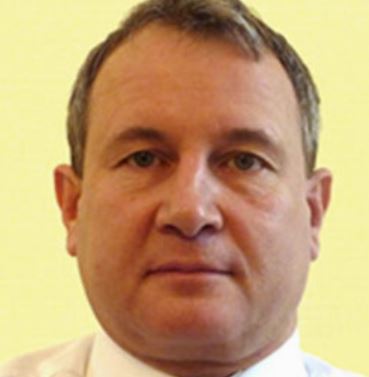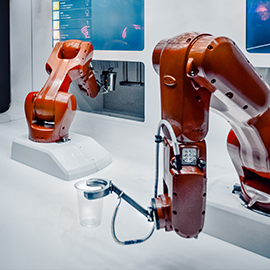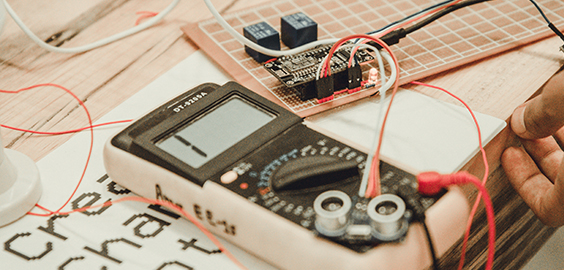Electrical Power Engineering MSc
18 Months Full-Time | September & January Start
 Option for Placement Year
Option for Placement Year
 Option for Study Abroad
Option for Study Abroad

If you鈥檇 like to receive the latest updates from Northumbria about our courses, events, finance & funding then enter your details below.
* At Northumbria we are strongly committed to protecting the privacy of personal data. To view the University鈥檚 Privacy Notice please click here
 Option for Placement Year
Option for Placement Year
 Option for Study Abroad
Option for Study Abroad

This program continually has a very high pass and student satisfaction rate, leading to numerous Ph.D. studies and employment.
You will develop cross-discipline skills through multidisciplinary group work and an individual dissertation. You will learn essential skills such as information research, project planning and management, cost analysis, and budgeting. You will be actively involved within the Faculty Research Seminars, where you can broaden awareness and views across different research areas.
You’ll benefit from the University’s excellent facilities that include specialist electrical and electronics laboratory resources. Northumbria has a well-established reputation for producing graduates who can apply their knowledge to generate creative solutions for sustainable electrical power systems.
On successfully completing the program, you will gain an understanding and comprehensive knowledge of current practice and new technological developments.Candidates must hold a CEng accredited BEng/BSc (Hons) undergraduate first degree to fully meet the CEng registration educational requirements.
Level of Study
Postgraduate
Mode of Study
18 months Full Time
2 other options available
Department
Mathematics, Physics and Electrical Engineering
Location
City Campus, Northumbria University
City
Newcastle
Start
September or January
Fees
Fee Information
Modules
Module Information
You’ll undertake a practical or theoretical master’s dissertation that will hone your skills in evaluating and applying research techniques and methodologies.
Assessments are designed to give feedback as well as to monitor your level of achievement. The assessed projects will enable you to test your skills in ways that relate to current industrial practice. Specific assessment methods include assignments, exams, technical reports and presentations.
Take a look at what Northumbria has to offer and discover what studying with us can do for you.
The quality of their research has put Northumbria University among the UK鈥檚 top 25% of universities for the percentage of research outputs in engineering that are ranked as world-leading or internationally excellent (Research Excellence Framework 2014).
Our reputation for quality is reflected by the range and depth of our collaborations with industry partners. Our industrial links help inform our curriculums and ensure a variety of site visits and input from practitioners via guest lectures.

Dr Haimeng Wu
Programme Leader

Dr Ian Forbes
Associate Professor

Dr Jing Jiang
Associate Professor

Dr Zhiwei Gao
Associate Professor
Take a look at what Northumbria has to offer and discover what studying with us can do for you.
Our New and Renewable Energy Laboratory is an excellent resource for research into power networks, wind energy, photovoltaics and battery testing for electric vehicles. All our facilities are backed up by a team of technicians who will give support and advice when you need it.
Technology Enhanced Learning (TEL) is embedded throughout the course with tools such as the ‘Blackboard’ eLearning Portal and electronic reading lists that will guide your preparation for seminars and independent research. Our use of lecture capture software will help you revise challenging material.
To facilitate group projects there is a working space called The Hub that’s well equipped for meetings and working with IT. The Zone is another area that’s popular with students undertaking group work or individual study.
Take a look at what Northumbria has to offer and discover what studying with us can do for you.
Throughout the course your learning will be directly impacted by the teaching team鈥檚 active research. Our specialist interests include electrical and electronic engineering, mobile communication, microelectronic, renewable and sustainable energy technologies, and advanced materials.
From statistics to complex and nonlinear phenomena, astrophysics to smart materials, and communications to renewable energy, the pioneering research in the Department of Mathematics, Physics and Electrical Engineering focuses on a wide range of issues.

Electrical Power & Control Systems
The group carries out research and development in grid integration of renewable energy sources, electric vehicles and more.
Read More
Optical Comms Research Group
The Optical Comms Research Group (OCRG) specialises in visible light comms, non-linear control systems & optical sensor research.
Read More
Renewable Energy Tech & Materials
Our research is focused on the development and improvements of providing low carbon and renewable energy.
Read More
Smart Materials & Surfaces Lab
Our research includes investigations into how surfaces can shape liquids, reduce drag and how forces can manipulate droplets.
Read More
Department Research
Take a look at what Northumbria has to offer and discover what studying with us can do for you.
The group projects will provide experience of working with others while also raising your awareness of commercial considerations and how industry operates. One project involves the development of an innovative product that must satisfy pre-determined criteria including a realistic business model.
Your dissertation can be linked to the University鈥檚 on-going research, giving you experience of being incorporated into a pre-existing working team and environment. Alternatively you can undertake a practice-based dissertation that鈥檚 linked to a project that you鈥檝e chosen for its relevance to your interests, self-development and career prospects.
When it comes to applying for jobs our Careers and Employment Service offers resources and support that will help you find roles matching your interests and skills. You will be able to access a range of workshops, one-to-one advice, and networking opportunities.
Take a look at what Northumbria has to offer and discover what studying with us can do for you.
You could also undertake a postgraduate research degree such as an MPhil, PhD and Professional Doctorate. If you decide to start up your own business, it鈥檚 good to know that the combined turnover of our graduates鈥� start-up companies is higher than that of any other UK university.
Whatever you decide to do, you will have the transferable skills that employers expect from a master鈥檚 graduate from Northumbria University. These include the ability to tackle complex issues through conceptualisation and undertaking research, the ability to contribute to new processes and knowledge, and the ability to formulate balanced judgements when considering incomplete or ambiguous data.
Take a look at what Northumbria has to offer and discover what studying with us can do for you.
Applicants should normally have:
A minimum of a 2:2 honours degree in Electrical Engineering with a focus on Electrical Power. Other subject qualifications, equivalent professional qualifications and/or relevant work experience will be considered on an individual basis.
International qualifications:
If you have studied a non UK qualification, you can see how your qualifications compare to the standard entry criteria, by selecting the country that you received the qualification in, from our country pages. Visit
English language requirements:
International applicants are required to have a minimum overall IELTS (Academic) score of 6.5 with 5.5 in each component (or approved equivalent*).
*The university accepts a large number of UK and International Qualifications in place of IELTS. You can find details of acceptable tests and the required grades you will need in our English Language section. Visit
Full UK Fee: £11,000
Full International Fee: £20,950
Scholarships and Discounts
ADDITIONAL COSTS
There are no Additional Costs
* At Northumbria we are strongly committed to protecting the privacy of personal data. To view the University鈥檚 Privacy Notice please click here
Please use the Apply Now button at the top of this page to submit your application.
Certain applications may need to be submitted via an external application system, such as UCAS, Lawcabs or DfE Apply.
The Apply Now button will redirect you to the relevant website if this is the case.
You can find further application advice, such as what to include in your application and what happens after you apply, on our Admissions Hub Admissions | Northumbria University
Module information is indicative and is reviewed annually therefore may be subject to change. Applicants will be informed if there are any changes.
KD7011 -
Wind Energy Conversion Systems (Core,20 Credits)
In this module you will consider the current practices and technological advances in the design, control, mathematical modelling, and performance optimisation of modern Wind Energy Conversion Systems. You will apply the necessary knowledge and gain understanding of the main concepts, methodologies, and future developments in this field. The module syllabus includes, but is not limited to, the following topics: wind energy resource; operating principles, characteristics and types of wind turbines; commercial and emerging distributed wind generators; power electronic converter topologies for variable speed systems; turbine aero-dynamics; grid-connected and stand-alone applications; research and development aspects; environmental and social context and issues; regulations and standards; economics, employment opportunities etc.
More informationKD7050 -
Photovoltaic System Technology (Core,20 Credits)
In this module, you will learn about the principles of photovoltaic (PV) system, design, operation and application. This will include consideration of the system components and the design and configuration of the solar array, together with examples of stand-alone, grid-connected and space applications. The module will also help you to appreciate the critical issues relating to the implementation of photovoltaic systems.
The topics within the module syllabus include:
鈥� PV arrays and system components
鈥� Grid connected PV systems, including large scale and building integrated systems
鈥� Stand-alone PV systems and applications
鈥� Concentrator PV systems
鈥� PV arrays for satellite power supply
鈥� Monitoring and performance analysis
鈥� Operation and maintenance, system lifetime, standards and regulations
KD7068 -
Renewable Energy Technologies for Electricity Supply (Core,20 Credits)
This module provides you with the opportunity to study the operation of the renewable energy technologies used for electricity generation, covering the aspects of resource assessment, operating characteristics, typical performance levels, economics, and environmental impact. You will also consider the context of the use of renewable energy systems, including aspects relating to power electronics techniques with grid connection and enabling technologies in power processing and energy storage.
The module introduces you to all the renewable technologies that can be used to generate electricity, including solar, water, wind, geothermal and biomass technologies. In addition, other type of renewable energy generation, power conversion and control techniques as well as energy storage technologies associated with the smart grids (e.g. electrical vehicles, power to hydrogen technologies etc) will be covered in this course module.
KD7069 -
Power Electronics and Drive Systems (Core,20 Credits)
This module aims to provide you with thorough understanding and knowledge of existing and new concepts and technologies in electrical power engineering, and apply the knowledges on design and industrial applications of power electronics and electric motor drives. You will cover the principles of advanced control techniques as applied to these systems. The module is specifically concerned with the following subjects: power electronics devices and conventional converter topologies; pulse-width-modulation (PWM) techniques; state of the art practical switching power converters; power quality and harmonic analysis of various power conversion systems; power electronics control of renewable energy sources including solar, wind, and fuel-cell energy systems as well as electric and hybrid vehicles; electric machines and drives fundamentals; space-vector theory, control and applications of DC and AC drives; vector and field-oriented control of high performance induction and synchronous motor drives; applications and efficiency of electric drives; regulations, standards and other professional issues.
More informationKD7070 -
Smart Grids (Core,20 Credits)
This module aims to deepen your understanding, knowledge and ability to study the existing electrical power distribution networks and to consider new concepts and technologies for future 鈥榮mart grid鈥� power networks. Emphasis will be given on the integration of renewable energy resources, electric vehicles, enabling technologies and the quality of supply. The module also covers advanced power electronics controllers and ICT techniques as applied to the smart grid.
This module also gives you the opportunity to critically analyse and develop an understanding of practical design and implementation issues, such as, quality of supply, cost considerations, regulations and standards. It explores the role of the built environment in the whole energy system, with a focus on the integration of renewables, demand response and static/mobile energy storage. You will develop skills in modelling, evaluation, and qualitative discussions of results, by applying your knowledge to develop techno-economic models of realistic case studies.
Topics covered will be reinforced by using real-world examples, case studies, and laboratory experiments. Published papers and simulations will be uploaded on eLearning portal to provide a good experience for students to see where the proposed algorithms/methods can be effectively applied.
KL7003 -
Academic Language Skills for Mathematics, Physics and Electrical Engineering (Core 鈥� for International and EU students only,0 Credits)
Academic skills when studying away from your home institution can differ due to cultural and language differences in teaching and assessment practices. This module is designed to support your transition in the use and practice of technical language and subject specific skills around assessments and teaching provision in your chosen subject area in the Department of Architecture and Built Environment. The overall aim of this module is to develop your abilities to read and study effectively for academic purposes; to develop your skills in analysing and using source material in seminars and academic writing and to develop your use and application of language and communications skills to a higher level.
The topics you will cover on the module include:
鈥� Understanding assignment briefs and exam questions.
鈥� Developing academic writing skills, including citation, paraphrasing, and summarising.
鈥� Practising 鈥榗ritical reading鈥� and 鈥榗ritical writing鈥�.
鈥� Planning and structuring academic assignments (e.g. essays, reports and presentations).
鈥� Avoiding academic misconduct and gaining credit by using academic sources and referencing effectively.
鈥� Listening skills for lectures.
鈥� Speaking in seminar presentations.
鈥� Giving discipline-related academic presentations, experiencing peer observation, and receiving formative feedback.
鈥� Speed reading techniques.
鈥� Discussing ethical issues in research, and analysing results.
鈥� Describing bias and limitations of research.
鈥� Developing self-reflection skills.
KL7022 -
Engineering Technology Management (Core,20 Credits)
In this module students will learn about Strategic Management, Project Management including Project Definition and its links to Project Success through the Management of Risk as well as Planning and Control of projects. Students will learn about management techniques and professional issues associated with relevant industry and society. They will enhance their critical reflection, analysis and other transferable skills which will aid their studies and support their career progression after graduating.
In addition, students will consider the role of ethics in delivering a Business Strategy and in their role as a manager. The Learning and Teaching strategy will engage students with lectures and online resources, much guided and independent reading about theory and practice as well as seminars where they will develop and improve their abilities and skills through reflection, discussion, and argument. The assessment will seek to move students from passive gatherers of knowledge to active participants in management decision making. Through the process they will refine and improve their own approaches to solving management problems in the subject disciplines. Students are required to critically analyse the management environment and to propose solution based on the module theory.
KD7065 -
MSc Engineering Project (Core,60 Credits)
This module allows you to engender a spirit of enquiry and thirst for knowledge into a practical or theoretical dissertation. It includes aspects of information research, retrieval and critical appraisal; research enquiry based upon practical and theoretical skills development and critical discussion and appraisal of results; and an opportunity to compose a thesis or research style paper and to deliver a technical presentation on the project.
This module aims to make use of the knowledge and analytic skills developed throughout the programme to provide solutions to real-world industrial and research problems. In this module you will develop:
鈥� Critical thinking on current engineering practices and their limitations, and exposure to state of the art technologies.
鈥� Independent problem solving skills to develop and propose solutions to fundamental and subtle problems.
鈥� An understanding and appreciation for the need and application of ethics within research and the wider society, and apply this in the context of the Engineering project undertaken.
鈥� Project management skills to organise and plan tasks with clear objectives, outcomes and timescales, and analyse the true 鈥渃ost鈥� in order to achieve project outcomes.
鈥� Key technical writing and presentation skills to a professional standard expected by both industry and academia.
These will provide a professional base from which you will be able to identify and use key knowledge, objectives, theories and techniques, plan and cost in order to bid, for funding, for future industrial and research projects. A key requirement of a professional engineer.
Module information is indicative and is reviewed annually therefore may be subject to change. Applicants will be informed if there are any changes.
KD7011 -
Wind Energy Conversion Systems (Core,20 Credits)
In this module you will consider the current practices and technological advances in the design, control, mathematical modelling, and performance optimisation of modern Wind Energy Conversion Systems. You will apply the necessary knowledge and gain understanding of the main concepts, methodologies, and future developments in this field. The module syllabus includes, but is not limited to, the following topics: wind energy resource; operating principles, characteristics and types of wind turbines; commercial and emerging distributed wind generators; power electronic converter topologies for variable speed systems; turbine aero-dynamics; grid-connected and stand-alone applications; research and development aspects; environmental and social context and issues; regulations and standards; economics, employment opportunities etc.
More informationKD7050 -
Photovoltaic System Technology (Core,20 Credits)
In this module, you will learn about the principles of photovoltaic (PV) system, design, operation and application. This will include consideration of the system components and the design and configuration of the solar array, together with examples of stand-alone, grid-connected and space applications. The module will also help you to appreciate the critical issues relating to the implementation of photovoltaic systems.
The topics within the module syllabus include:
鈥� PV arrays and system components
鈥� Grid connected PV systems, including large scale and building integrated systems
鈥� Stand-alone PV systems and applications
鈥� Concentrator PV systems
鈥� PV arrays for satellite power supply
鈥� Monitoring and performance analysis
鈥� Operation and maintenance, system lifetime, standards and regulations
KD7068 -
Renewable Energy Technologies for Electricity Supply (Core,20 Credits)
This module provides you with the opportunity to study the operation of the renewable energy technologies used for electricity generation, covering the aspects of resource assessment, operating characteristics, typical performance levels, economics, and environmental impact. You will also consider the context of the use of renewable energy systems, including aspects relating to power electronics techniques with grid connection and enabling technologies in power processing and energy storage.
The module introduces you to all the renewable technologies that can be used to generate electricity, including solar, water, wind, geothermal and biomass technologies. In addition, other type of renewable energy generation, power conversion and control techniques as well as energy storage technologies associated with the smart grids (e.g. electrical vehicles, power to hydrogen technologies etc) will be covered in this course module.
KD7069 -
Power Electronics and Drive Systems (Core,20 Credits)
This module aims to provide you with thorough understanding and knowledge of existing and new concepts and technologies in electrical power engineering, and apply the knowledges on design and industrial applications of power electronics and electric motor drives. You will cover the principles of advanced control techniques as applied to these systems. The module is specifically concerned with the following subjects: power electronics devices and conventional converter topologies; pulse-width-modulation (PWM) techniques; state of the art practical switching power converters; power quality and harmonic analysis of various power conversion systems; power electronics control of renewable energy sources including solar, wind, and fuel-cell energy systems as well as electric and hybrid vehicles; electric machines and drives fundamentals; space-vector theory, control and applications of DC and AC drives; vector and field-oriented control of high performance induction and synchronous motor drives; applications and efficiency of electric drives; regulations, standards and other professional issues.
More informationKD7070 -
Smart Grids (Core,20 Credits)
This module aims to deepen your understanding, knowledge and ability to study the existing electrical power distribution networks and to consider new concepts and technologies for future 鈥榮mart grid鈥� power networks. Emphasis will be given on the integration of renewable energy resources, electric vehicles, enabling technologies and the quality of supply. The module also covers advanced power electronics controllers and ICT techniques as applied to the smart grid.
This module also gives you the opportunity to critically analyse and develop an understanding of practical design and implementation issues, such as, quality of supply, cost considerations, regulations and standards. It explores the role of the built environment in the whole energy system, with a focus on the integration of renewables, demand response and static/mobile energy storage. You will develop skills in modelling, evaluation, and qualitative discussions of results, by applying your knowledge to develop techno-economic models of realistic case studies.
Topics covered will be reinforced by using real-world examples, case studies, and laboratory experiments. Published papers and simulations will be uploaded on eLearning portal to provide a good experience for students to see where the proposed algorithms/methods can be effectively applied.
KL7003 -
Academic Language Skills for Mathematics, Physics and Electrical Engineering (Core 鈥� for International and EU students only,0 Credits)
Academic skills when studying away from your home institution can differ due to cultural and language differences in teaching and assessment practices. This module is designed to support your transition in the use and practice of technical language and subject specific skills around assessments and teaching provision in your chosen subject area in the Department of Architecture and Built Environment. The overall aim of this module is to develop your abilities to read and study effectively for academic purposes; to develop your skills in analysing and using source material in seminars and academic writing and to develop your use and application of language and communications skills to a higher level.
The topics you will cover on the module include:
鈥� Understanding assignment briefs and exam questions.
鈥� Developing academic writing skills, including citation, paraphrasing, and summarising.
鈥� Practising 鈥榗ritical reading鈥� and 鈥榗ritical writing鈥�.
鈥� Planning and structuring academic assignments (e.g. essays, reports and presentations).
鈥� Avoiding academic misconduct and gaining credit by using academic sources and referencing effectively.
鈥� Listening skills for lectures.
鈥� Speaking in seminar presentations.
鈥� Giving discipline-related academic presentations, experiencing peer observation, and receiving formative feedback.
鈥� Speed reading techniques.
鈥� Discussing ethical issues in research, and analysing results.
鈥� Describing bias and limitations of research.
鈥� Developing self-reflection skills.
KL7022 -
Engineering Technology Management (Core,20 Credits)
In this module students will learn about Strategic Management, Project Management including Project Definition and its links to Project Success through the Management of Risk as well as Planning and Control of projects. Students will learn about management techniques and professional issues associated with relevant industry and society. They will enhance their critical reflection, analysis and other transferable skills which will aid their studies and support their career progression after graduating.
In addition, students will consider the role of ethics in delivering a Business Strategy and in their role as a manager. The Learning and Teaching strategy will engage students with lectures and online resources, much guided and independent reading about theory and practice as well as seminars where they will develop and improve their abilities and skills through reflection, discussion, and argument. The assessment will seek to move students from passive gatherers of knowledge to active participants in management decision making. Through the process they will refine and improve their own approaches to solving management problems in the subject disciplines. Students are required to critically analyse the management environment and to propose solution based on the module theory.
KD7065 -
MSc Engineering Project (Core,60 Credits)
This module allows you to engender a spirit of enquiry and thirst for knowledge into a practical or theoretical dissertation. It includes aspects of information research, retrieval and critical appraisal; research enquiry based upon practical and theoretical skills development and critical discussion and appraisal of results; and an opportunity to compose a thesis or research style paper and to deliver a technical presentation on the project.
This module aims to make use of the knowledge and analytic skills developed throughout the programme to provide solutions to real-world industrial and research problems. In this module you will develop:
鈥� Critical thinking on current engineering practices and their limitations, and exposure to state of the art technologies.
鈥� Independent problem solving skills to develop and propose solutions to fundamental and subtle problems.
鈥� An understanding and appreciation for the need and application of ethics within research and the wider society, and apply this in the context of the Engineering project undertaken.
鈥� Project management skills to organise and plan tasks with clear objectives, outcomes and timescales, and analyse the true 鈥渃ost鈥� in order to achieve project outcomes.
鈥� Key technical writing and presentation skills to a professional standard expected by both industry and academia.
These will provide a professional base from which you will be able to identify and use key knowledge, objectives, theories and techniques, plan and cost in order to bid, for funding, for future industrial and research projects. A key requirement of a professional engineer.
The following alternative study options are available for this course:
Sep start
Sep start
2 years Full Time (with Advanced Practice in the second year) / Sep start
More details Add to My CoursesTo start your application, simply select the month you would like to start your course.
SEPTEMBER
2025
JANUARY
2026
Our Applicant Services team will be happy to help. They can be contacted on 0191 406 0901 or by using our .
Full time Courses are primarily delivered via on-campus face to face learning but could include elements of online learning. Most courses run as planned and as promoted on our website and via our marketing materials, but if there are any substantial changes (as determined by the Competition and Markets Authority) to a course or there is the potential that course may be withdrawn, we will notify all affected applicants as soon as possible with advice and guidance regarding their options. It is also important to be aware that optional modules listed on course pages may be subject to change depending on uptake numbers each year.
Contact time is subject to increase or decrease in line with possible restrictions imposed by the government or the University in the interest of maintaining the health and safety and wellbeing of students, staff, and visitors if this is deemed necessary in future.
Northumbria University is committed to developing an inclusive, diverse and accessible campus and wider University community and are determined to ensure that opportunities we provide are open to all.
We are proud to work in partnership with to provide Detailed Access Guides to our buildings and facilities across our City, Coach Lane and London Campuses. A Detailed Access Guide lets you know what access will be like when you visit somewhere. It looks at the route you will use getting in and what is available inside. All guides have Accessibility Symbols that give you a quick overview of what is available, and photographs to show you what to expect. The guides are produced by trained surveyors who visit our campuses annually to ensure you have trusted and accurate information.
You can use Northumbria’s AccessAble Guides anytime to check the accessibility of a building or facility and to plan your routes and journeys. Search by location, building or accessibility feature to find the information you need.
We are dedicated to helping students who may require additional support during their student journey and offer 1-1 advice and guidance appropriate to individual requirements. If you feel you may need additional support you can find out more about what we offer here where you can also contact us with any questions you may have:
If you鈥檇 like to receive the latest updates from Northumbria about our courses, events, finance & funding then enter your details below.
* At Northumbria we are strongly committed to protecting the privacy of personal data. To view the University鈥檚 Privacy Notice please click here
Back to top